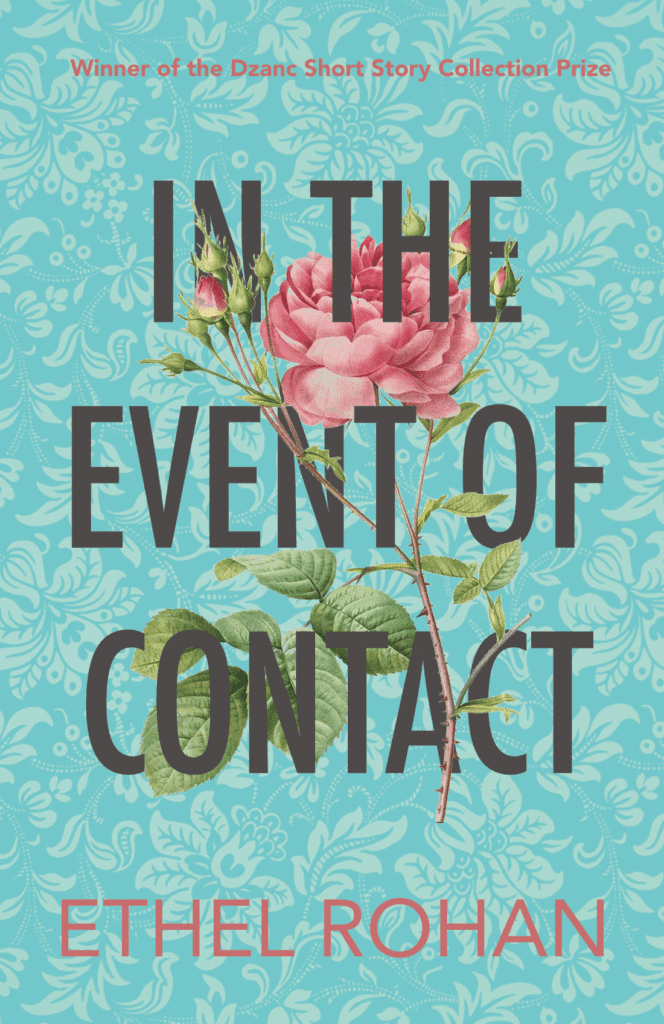People are shaped by people. In In the Event of Contact (180 pages; Dzanc Books), San Francisco author Ethel Rohan cements this broad maxim into a specific and learned law of life via the host of complicated characters she creates in her fourteen stories. Each character navigates distinct anguishes, from irreparable guilt to insatiable longing to persistent disappointment, linked only by a home country of Ireland and the theme of human connection.
The first story in the collection, after which the book is titled, introduces this theme in its most literal sense via Ruth, a character with a debilitating phobia of being touched. The narrator, one of her triplets, meets this phobia with anger and blame and the insistence that this shouldn’t apply to her or their third sister, “her two-thirds,” “a part of her.” When they devise a plan to “trick her into recovery,” donning gloves and flitting a fingertip across her face in her sleep, her ensuing screaming fit sends the whole family running. They hire a private teacher for Ruth after a touch from a schoolmate sends her into convulsions, and when he seems to get through to her in a way no one else can, the narrator resents him for it. “I’d have done that for you. All these years, I’ve begged,” she rasps through tears. All this jealousy and hurt, just because she cannot touch this person who she sees as a part of herself. Such is the power of contact.
Stitched throughout the book is this idea of characters being a part of one another, or taking parts of each other. Rohan’s characters are physical constructions, the components of which can be lost or stolen. The seventh story, titled “At the Side of the Road,” follows adolescent Cissie Murray as she drifts through her day job, a near-death van ride, and a hazy concert, mourning her breakup with a boy who had “reached inside her chest and pulled out some tiny, essential part, dimming the rest of her.” In a book that explores connections between people, the exploration of the termination of said connections is also crucial. Rohan shoulders this requisite with ease and grace, painting moving narratives of loss, whether it be Cissie’s painful but mundane breakup or the three dead husbands of an unnamed narrator in the story “Collisions.”
Rohan expertly draws meaning out of the interactions, as well as the distances, between her characters; a dishonored priest and his housekeeper, a woman and the childhood friend she lost to an abduction, a cheating man and his fiercely loyal mother, a school traffic warden left helpless by a truck and the teacher who in turn helps and hurts him. These impressively diverse characters share only one explicit detail: Irish heritage. Some still call Ireland their home, while others have moved away, but again and again returns the concept of people leaving parts of themselves behind after departing their place of origin. Sometimes it’s parents, siblings, or merely memories, but here lies the sole bridge between otherwise disparate stories.
Rohan is a master of building people, forging bonds between them, and then severing them all at once. In the collection’s penultimate piece, “Any Wonder Left,” a woman performs the same repeated erasure of passed love ones, first her mother, then her husband, and finally, her father. She swiftly and purposefully disposes of their belongings, the material parts of them that remain after they have gone. Emptied, she questions in a striking final line where any remaining wonder might lie—“the ridding, clearing, I’d made space for it, hadn’t I?” Each of Rohan’s stories culminate in sentences that leave just enough questions but provide thematic closure, and maybe this is why she is so good at writing about endings. In “Blue Hot,” the tenth story, a girl reflects on an abusive relationship in an aching last line where the theme of erasure returns: “the more he shook me, the more he erased us, until I’d never gone looking for it in the first place, that thing called love.”

